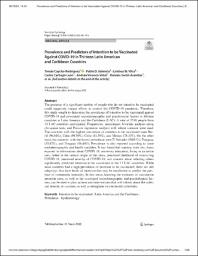Prevalence and Predictors of Intention to be Vaccinated Against COVID‑19 in Thirteen Latin American and Caribbean Countries

Ver/
Descargar
(application/pdf: 8.152Mb)
(application/pdf: 8.152Mb)
Fecha
2022-03-21Autor(es)
Caycho‑Rodríguez, Tomás
Valencia, Pablo D.
Vilca, Lindsey W.
Carbajal‑León, Carlos
Vivanco‑Vidal, Andrea
Saroli‑Araníbar, Daniela
Metadatos
Mostrar el registro completo del ítemResumen
The presence of a significant number of people who do not intend to be vaccinated could negatively impact efforts to control the COVID-19 pandemic. Therefore, this study sought to determine the prevalence of intention to be vaccinated against COVID-19 and associated sociodemographic and psychosocial factors in thirteen countries in Latin America and the Caribbean (LAC). A total of 5510 people from 13 LAC countries participated. Frequencies, percentages, bivariate analyses using chi-square tests, and Poisson regression analysis with robust variance were used. The countries with the highest prevalence of intention to be vaccinated were Bra-zil (96.94%), Cuba (89.59%), Chile (84.59%), and Mexico (78.33%). On the other hand, the countries with the lowest prevalence were El Salvador (54.01%), Paraguay (55.87%), and Uruguay (56.40%). Prevalence is also reported according to some sociodemographic and health variables. It was found that country, male sex, hours exposed to information about COVID-19, university education, living in an urban area, belief in the animal origin of the virus, perceived likelihood of contracting COVID-19, perceived severity of COVID-19, and concern about infecting others significantly predicted intention to be vaccinated in the 13 LAC countries. While most countries had a high prevalence of intention to be vaccinated, there are still subgroups that have levels of intention that may be insufficient to predict the pres-ence of community immunity. In this sense, knowing the estimates of vaccination intention rates, as well as the associated sociodemographic and psychological fac-tors, can be used to plan actions and interventions that will inform about the safety and benefits of vaccines, as well as strengthen trust in health authorities.
Palabras clave
Colecciones
- SCOPUS [380]

